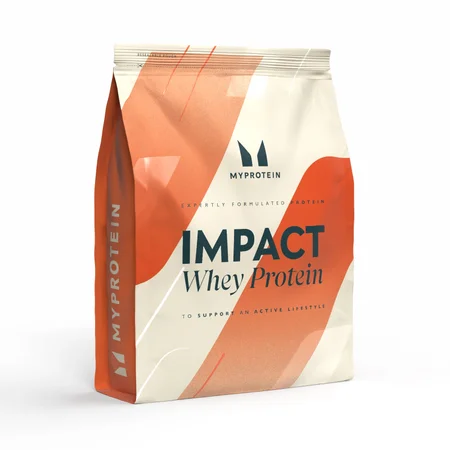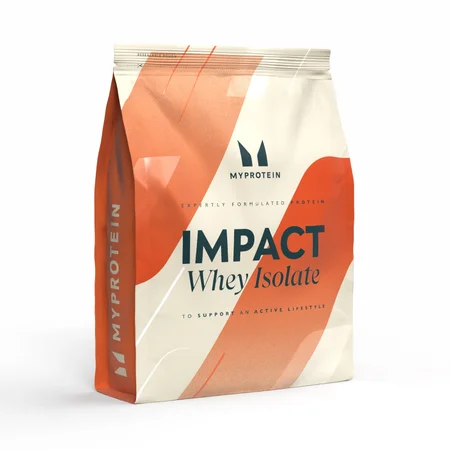Best Whey Protein | The Difference Between Impact Whey & Impact Whey Isolate?

The best whey protein powder to choose
Whey protein contains protein, fat, carbs, vitamins and minerals. Due to its strong amino acid content and its ability to be absorbed by the body, it’s ideal for building muscle. It has been shown to promote muscle protein synthesis, support fat burning, and suppress appetite.1 It has also been shown to increase the production of glutathione, which is anantioxidant.2
Protein powders are available in the form of whey concentrate or whey isolate. Both contain protein; however, isolate, which is made from whey concentrate, undergoes further processing to yield a product with a higher protein concentration.
- What is whey concentrate?
- Whey concentrate benefits
- What is whey isolate?
- Whey isolate benefits
- Flavour & gain control
- FAQs

What is whey concentrate?
Whey protein is produced when liquid portions of milk are pushed through a refined filter. The material left behind dries to form whey protein concentrate. This form of whey varies on the amount of fat and carbohydrates in the form of lactose.
The protein content varies between 30-80%, and it can include numerous protein sub-fractions.
Whey protein concentrate benefits:
- Tends to be cheaper than whey isolate.
- Is a complete protein source, meaning it contains all nine essential amino acids.
- Is low in carbohydrates and fats.
What is whey isolate?
While concentrate has a protein content of approximately 80%, isolate’s is approximately 90%. This is due to cross-flow microfiltration, which causes the protein to separate from fat and lactose. Whey isolate is a popular choice for people on low-fat diets, as it’s lower in fat compared to concentrate.
Whey isolate is also much lower in lactose, making it ideal for those with an intolerance. As whey concentrate is further processed and purified to make whey isolate, the structure becomes degraded and loses some of its biological activity. However, the amino acid structure and sequence is unaffected, which is what’s important for building muscle. All large proteins are broken down into amino acids during digestion anyway, so whether this happens in your gut or during a manufacture makes no difference at all.
The choice of whey you choose should depend on your goals, budget and allergies. As whey concentrate has a significantly higher amount of lactose, it’s better to opt for isolate if you’re lactose intolerant. However, as isolate requires more processing than concentrate, it is also more expensive.
Whey isolate benefits:
- Is lower in carbohydrates than whey concentrate.
- Is lower in fat than whey concentrate.
- It also has higher protein content than whey protein concentrate.
- Is lower in lactose than concentrate.
- Is also a complete protein source.
Flavour & Gain Control
| Comparison: | Impact Whey Protein | Impact Whey Isolate |
| Kcal (per 25g) | 103 | 93 |
| Fat (per 25g) | 1.9 | 0.1 |
| Carbs (per 25g) | 1.0 | 0.6 |
| Protein (per 25g) | 21 | 23 |
| Number Flavours Available | 51 | 22 |

How Many Protein Shakes A Day is Healthy?
An experts advice on what you need, depending on your goals.
FAQs
Whey concentrate is created by pushing liquid portions of milk through a filter. The material left is then dried to form whey concentrate, which consists of around 80% protein.
Whey isolate has a protein content greater than 90%. It also has lower lactose content than whey concentrate.
Per 25g, Impact Whey contains 1.9g of fat, while Impact Whey Isolate contains 0.1g.
Per 25g, Impact Whey contains 1g of carbs, whilst Impact Whey Isolate contains 0.6g.
Per 25g, Impact Whey contains 103 kcal, while Impact Whey Isolate contains 93 kcal.
Take home message
Whey protein concentrate and isolate are both excellent sources of protein. However, isolate is slightly purer, resulting in a higher protein concentration with less fat, carbs, calories and lactose. The difference in price (isolate is slightly more expensive) reflects the extra manufacturing steps it takes to purify the whey protein.








